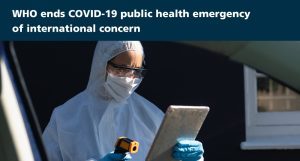The World Health Organization (WHO) has announced that COVID-19 is no longer a public health emergency of international concern (PHEIC). The decision was made following a recommendation from the organization’s COVID-19 emergency committee, which highlighted decreasing deaths and hospitalizations and high levels of immunity against SARS-CoV-2. WHO Director-General Tedros Adhanom Ghebreyesus stressed that COVID-19 is still a global health threat, and countries should transition from emergency mode to managing COVID-19 alongside other infectious diseases. The end of the PHEIC will not affect countries that have already relaxed measures, but epidemiologists warn about the impact on resources and access to diagnostics and treatments.




